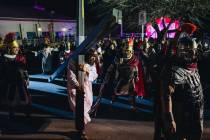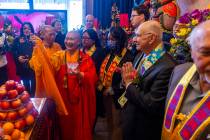Hanukkah feels yuletide influence
It’s beginning to look a lot like Christmas. But Hanukkah is not the Jewish equivalent. On the Hebrew calendar, in fact, it’s small potato latkes.
“It will never be a Jewish Christmas,” says Rabbi Sanford Akselrad of Reform Congregation Ner Tamid. “It will never compete with it in scope and scale. It wasn’t intended to.”
The miracle that Hanukkah commemorates doesn’t hold a candle — no less eight of them — to what the birth of Jesus Christ represents to Christians.
According to theologians, the Maccabean Jews won a lengthy battle against the ruling Hellenistic Syrians in Jerusalem in the second century B.C. But that wasn’t the miracle. The Jews returned to the Temple, so the story goes, but it had been sullied by pig sacrifices and other non-Jewish rituals. They wanted it restored and rededicated. (Hanukkah means dedication.)
The purified olive oil used to fuel the Temple’s eternal flame was believed to be a day’s supply. But it lasted eight — thus, Hanukkah’s eight candles/nights — which was how long it took to procure new oil.
In case you’re waiting for a big finish, that was it.
“It’s a rabbinic holiday,” notes Rabbi Felipe Goodman of Las Vegas’ Conservative Temple Beth Sholom. “It’s not in the Torah. It’s not like Passover, Yom Kippur or Rosh Hashana.”
And yet here this minor Jewish holiday crops up every year — starting Thursday this year — always within a month of the second-holiest day on the Christian calendar after Easter. (Its seemingly random distance owes to the inconsistent leap compensations of the Hebrew and Gregorian calendars.)
If not for its yuletide proximity, Hanukkah probably would have fallen by the wayside — as did many other minor Jewish holidays over the eons.
“Hanukkah owes a great debt of gratitude to Christmas for making it famous,” says Rabbi Yitzchak Wyne of the Orthodox Young Israel Aish Congregation of Las Vegas. “If it didn’t fall around Christmas, no one would celebrate it.”
How Jews choose to celebrate it has become the issue in many temples. The traditional way involved little more than lighting the candles of the nine-branched menorah — one each night while saying a prayer (the ninth holder is for the candle used to light the others). Nowadays, in some Jewish homes, gift-wrapped Xboxes wait underneath Hanukkah bushes for Dec. 25. While some others may not go that far, their scope of gift-giving has increased.
“Hanukkah wasn’t about gift-giving,” Akselrad says. “It had a little dreidel game with gold coins, but not much.
“After World War II, Jewish parents — out of guilt — assimilated a bit,” he continues. “They didn’t want their children to feel left out, so they started gift-giving.”
Ironically, according to the story of Hanukkah, it’s assimilation that the Maccabees were fighting against. Syria’s King Antiochus IV Epiphanes banned Jewish holidays and killed any Jews who refused to worship Zeus. (The dreidel, a spinning top with Hebrew letters on each side, was invented as a ruse, so any Jews caught studying in Torah groups could quickly pretend they were gambling.)
“With a tremendous amount of marketing, Hanukkah was turned by people into a holiday to sell stuff to us,” Goodman says, expressing perhaps the strongest commonality Hanukkah shares with Christmas besides the calendar: the chafing of its religious origins against the pressure of commercialism.
“Beware the God of Macy’s,” Akselrad jokes. “He is a jealous and zealous God.”
So what can parents trying to raise children in the Jewish faith — or at least aware of their Jewish roots — do to fight the desire to share in the holly-jolliness shutting down every other home on the block? Should they try to fight it?
“We’re always fighting things that are sexier and more attractive when it comes to presenting religious values,” Akselrad says, echoing the sentiment of his fellow rabbis. “The way to do it is not to copy or emulate, but to emphasize the beauty of our own heritage every day of the year.”
Contact reporter Corey Levitan at clevitan@ reviewjournal.com or 702-383-0456.


















